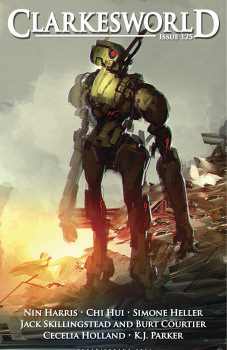 Clarkesworld #125, February 2017
Clarkesworld #125, February 2017
“Assassins” by Jack Skillingstead and Burt Courtier
Reviewed by Clancy Weeks
Jack Skillingstead and Burt Courtier, in their story “Assassins,” give us Sonia, one of a multitude of coders working for the Editors, creating virtual characters living in ongoing media stories for the amusement of the public. At least, that’s what she did until the Editors killed off her most famous character due to low ratings. Now she is a virtual assassin, killing popular characters in the virtual world in the guise of her new creation, Simone the Slayer. Perversely popular in her own right, Simone’s one function is to destroy the most popular constructs while Sonia witnesses the results on real people in real-time. Simone is so good at her job she inspires imitation, and such imitation often crosses boundaries in either direction.
Skillingstead and Courtier examine the odd amount of attention people invest in the characters they see on screen. In this world, there is even a deep level of interaction between the real and virtual world, adding to the loss real people can feel after the death of a beloved character. The story draws nice parallels to the current obsession with reality shows, and the people we watch. When all is said and done, though, it is the interaction between flesh and blood people that really matters. Good stuff, and worth the read.
What if identity thieves actually stole a person’s identity? What would they really have? Nin Harris explores this to good effect in “Prosthetic Daughter.” Yun-Li is both friend and thief, someone capable of excising memories to such effect the victim doesn’t even know it’s happening. Worse, neither do the families. Yun-Li, jealous of Zhen-Juan’s swift rise to Admiral over her own plodding career, has taken the latter’s identity, though not noticing the trap that lay there.
There is a lot for the reader to wrap their head around in this story, and it ends up muddying the point. The pacing is uneven, and at times is more info-dump than action. That could be forgiven if there were more of a payoff at the end.
“How Bees Fly” by Simone Heller is a marvellous SF tale (regardless of the use of the term “demon”) of one creature’s thirst for knowledge overcoming a lifetime of rigid indoctrination. When “the other” is a different species, the twin acts of acceptance and an extended hand of friendship become that much more powerful. Her community’s midwife, the protagonist meets two demons on the road, forever changing her life. Who knew demons could be so kind?
Understanding “the other” is hard, which is why so few people do it. This is the kind of lesson SF was built to deliver, and Heller does it with grace and a dash of humor. We can laugh at the backward thinking of the midwife and her people, or we can help them along in their understanding of the world and everyone’s place in it. Very well done and recommended.
In the SF novelette, “Rain Ship” by Chi Hui, Jin is a full-time mercenary, soldier, assassin, and some-time cop, and is about to have a very bad day. Summoned by Dr. Hort to the Human-built Rain Ship as protection for the team of archaeologists and relic hunters, she is soon besieged by pirates and a mysterious other. Her species, the Ruderans, have been on their own ever since Humans abandoned their place in the universe over a hundred million years ago, and every Human technological find is priceless. Sometimes, archaeology is less about unearthing artifacts, and more about unearthing your own past.
Hui does an outstanding job here mingling action with a much broader universe and story. There is so much to the world-building that someone felt the need to add endnotes—none of which added one whit to the story itself, and, in fact, caused multiple instances of pulling me out of the narrative. My suggestion? Ignore them. Everything works fine without them, and most readers are intelligent enough to fill in the details of the world without them. Other than that one niggle, this is a great and fun yarn with a solid Golden Age of SF feel, and is highly recommended.
Clancy Weeks is a composer by training, with over two-dozen published works for wind ensemble and orchestra—his most recent work, “Selene,” was premiered in Houston on April 3rd, 2016—and an author only in his fevered imagination. Having read SF/F for nearly fifty years, he figured “What the hell, I can do that,” and has set out to prove that, well… maybe not so much. His first short story, “Zombie Like Me,” will appear in an upcoming issue of Stupefying Stories. He currently resides in Texas, but don’t hold that against him.